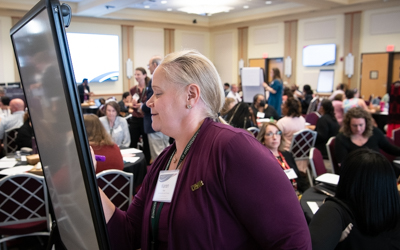October 2023
How does the University of Maryland, Baltimore’s (UMB) mission statement shape its current strategic plan? Should UMB revise that statement to reflect shifts in how students are taught or research is conducted post-pandemic? How does it feel or look when policies and procedures related to ethics are working, and why is it important for members of the University’s community to act with integrity?
These are just a few of the questions participants from all parts of campus discussed during an Oct. 3 Middle States Town Hall, the first in a series of five such meetings that will be held at UMB throughout fall. Part of the University’s Middle States Commission on Higher Education (MSCHE) accreditation self-study process, the two-hour event centered on lively conversations as UMB community members shared their diverse experiences and perspectives in an inclusive, transparent, and thorough analysis of the University’s policies and practices.

Karen Park, MA, MBA, director of strategic projects and chief of staff to the chief business and finance officer/senior vice president for administration and finance, takes part in the town hall.
Vice Provost for Graduate Education and Dean of the Graduate School Kenneth Wong, PhD, who took part in the kickoff event, said this kind of community input is vital to the accreditation process, because it provides an opportunity for everyone on campus to think critically and reflectively about how UMB is performing today, and how it might do better tomorrow.
“I look at accreditation as something that we must do because there are requirements around it,” Wong said, before stressing, “But it’s also something that’s really important for any organization — to take that time and reflect on its mission, on its goals, and improve them in the future.”
A regional accrediting organization that uses peer evaluation to assure the quality and improvement of educational institutions, MSCHE is one of seven such organizations across the country. UMB, which first earned accreditation by the commission in 1921, currently undergoes a reaccreditation cycle every eight years. Along with ensuring that UMB is in compliance with the commission’s standards of excellence, MSCHE accreditation is an opportunity to strengthen the University through a comprehensive evaluation. It is also necessary for the University to continue to receive federal funding.
The full accreditation process includes two major components: the creation and submission of a self-study report to MSCHE and a multi-day site visit and review by peer evaluators from other accredited institutions, scheduled for spring 2025. UMB is currently engaged in gathering information for the self-study, which will examine how the University meets or exceeds the commission’s seven standards for accreditation and identify areas and strategies for improvement.
The series of Middle States Town Halls are an important part of that process, as participants from all corners of campus will work in small groups to assess UMB’s efforts in MSCHE standards and related requirements. Those attending the Oct. 3 event discussed the commission's first two standards: Mission and Goals, and Ethics and Integrity.
Leilani Uttenreither, MM, assistant to the provost and executive vice president, took part in a group focused on Ethics and Integrity. She said the group delved into the effectiveness of UMB’s core values and institutional policies in providing guidelines to meet that standard.
A member of the Middle States Self Study Logistics Committee, Uttenreither reflected on the importance of gathering feedback from people who have “feet on the ground” across campus and underlined that town hall participants “get a chance to provide feedback to the leadership to let us know what they think, what’s going well, what’s not going well.”
The process is being led by a Self-Study Steering Committee, which is co-chaired by Provost and Executive Vice President Roger J. Ward, EdD, JD, MSL, MPA, and School of Dentistry Dean Mark Reynolds, DDS, PhD, MA. With broad representation across the University, including 24 staff, faculty, and students, the Steering Committee has appointed seven Self-Study Working Groups, each charged with producing a draft chapter for one of MSCHE’s standards that shows evidence of compliance and identifies areas of possible noncompliance and opportunities for improvement.
Alison Watkins, JD, MS, assistant vice president for policy oversight and conflict of interest officer, is part of the Steering Committee’s Ethics and Integrity Working Group. She reiterated the value of hearing from people representing a variety of schools and offices.
“We had a lot of folks from different schools that provided a lot of different perspectives on ethics and integrity,” she said, and added that everyone in the small group she was in was thoroughly engaged in the discussion. “It presented a great opportunity to learn from others what’s working well and areas that we can improve on.”
Wong encouraged UMB community members to participate in upcoming town hall meetings.
“It’s very important that we get a wide range of perspectives,” he said, and emphasized the ability to better understand the experience of people across campus through the self-study process will help make UMB a better place for everyone.
The remaining Middle States Town Halls are scheduled for November. Three will be held in-person at the Elm Ballroom in the SMC Campus Center, with participants examining the remaining five MSCHE standards for accreditation. The final event in the series, which will address all seven MSCHE standards, will be held virtually via Zoom. Their dates are:
- Nov. 1, 1 p.m., Planning, Resources and Institutional Improvement / Governance, Leadership and Administration
- Nov. 8, Noon, Design and Delivery of the Student Learning Experience / Support of the Student Experience
- Nov. 13, 2:30 p.m., Educational Effectiveness Assessment
- Nov. 16, 11 a.m., MSCHE Seven Standards of Accreditation
Search UMB News
Sign up for UMB Alerts.



